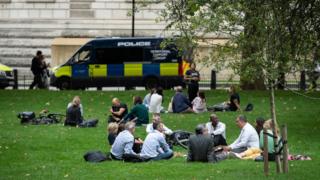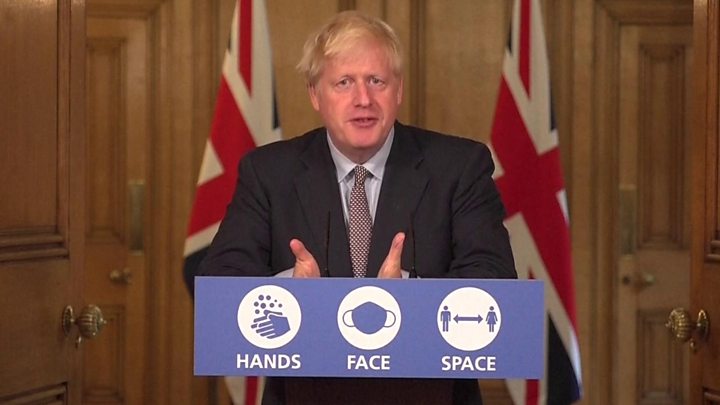 Image copyright
Getty Images
Image copyright
Getty Images
The new coronavirus rules in England banning social gatherings of more than six people will not be kept in place "any longer than we have to", Health Secretary Matt Hancock has said.
"This sacrifice is vital to control the virus for the long term," he told MPs.
The law comes into force on Monday and will be enforced through a £100 fine.
Mr Hancock was also heckled by some MPs as he spoke about the government's plans for mass coronavirus testing, after concerns it was unrealistic.
Scientists and health professionals have said the technology for the government's plan for more rapid tests "does not, as yet, exist", and there are already issues with laboratory capacity.
Groups of six
The new "rule of six" was set out by Prime Minister Boris Johnson on Wednesday, as the UK reported more than 2,000 new coronavirus cases for the fourth consecutive day.
It applies both indoors and outdoors and to all ages - although there are some exemptions, such as gatherings for work.
On Thursday, Scotland changed its rules on socialising to a maximum of six people inside and outside - but unlike England they must be from two households, and children under 12 are exempt.
"As the chief medical officer said yesterday, we must learn from the recent experience of countries like Belgium who successfully put in place these measures to combat a similar rise in infections," said Mr Hancock in Parliament on Thursday.
"These are not measures that we take lightly. I understand that for many they'll mean changing long-awaited plans or missing out on precious moments with loved ones, but this sacrifice is vital to control the virus for the long term and save lives.
"And I vow that we will not keep these rules in place for any longer than we have to."
Earlier, Mr Hancock's colleague, Transport Secretary Grant Shapps, said if everybody followed the rules "we may well be by Christmas in a position to look at it again".
Former government adviser Prof Neil Ferguson said it will take about "two to three weeks" to see what effect the social distancing measures have.
"So we need to wait at this point and see how much we flatten the curve and then if that's not sufficient to bring the reproduction number below one, so the epidemic starts shrinking again, then yes, we may need to clamp down on other areas," he added.

Media playback is unsupported on your device
Prof Ferguson - whose advice to the prime minister led to the UK lockdown - said it was unavoidable that the virus would resurge in all age groups.
And asked about the government's push to get people to return to work, Prof Ferguson added: "Certainly I think we should hesitate and maybe pause at the headlong rush to get everybody back into offices.
"But some people have to work and I completely understand the concerns in many quarters that everybody working at home has an economic impact, particularly on city centres."
At-a-glance: What are the new rules?
Social gatherings of more than six people in England will not be allowed in law from Monday 14 September The new rule applies to people in private homes, indoors and outdoors, and places such as pubs, restaurants, cafes and public outdoor spaces It applies to all ages The rule does not apply to schools and workplaces, to people living together or in the same support bubble, or to weddings, funerals and organised team sports The full list of exemptions also includes protests and political activities subject to "strict risk assessments", jury service and providing emergency assistance People who ignore the police could be fined £100 - doubling with each offence to a maximum of £3,200Mr Hancock was also asked about the government's testing plan.
The next immediate goal for the government is to increase testing capacity to 500,000 tests a day by the end of October. Currently, testing capacity is being reported as 350,000 a day - which includes swab tests (which check if you have the virus currently) and antibody tests (which check if someone has already had the virus).
But the government is also planning "Operation Moonshot" - which aims to see millions of tests processed every day.
This would involve using a new type of test, which is not yet rolled out, involving swabs or saliva and can give results in 90 or even 20 minutes.
Mr Hancock was heckled by some opposition MPs as he outlined "Moonshot", responding: "I'm absolutely determined that we will get there.
"And if everything comes together, and if the technology comes off, it'll be possible even for challenging sectors like theatres to get closer to normal before Christmas."
He said the approach was being piloted and steps are being taken to verify the new technology ahead of a desired nationwide roll-out.
Image copyright Getty Images Image caption A man swabs his mouth in Bolton, which is facing local lockdown restrictionsEarlier, the chairman of the British Medical Association Dr Chaand Nagpaul said it was unclear how Operation Moonshot would work - given the "huge problems" currently seen with lab capacity.
And other scientists warned of the dangers of false negatives and false positives.
On Thursday, Scotland launched its new contact tracing app, with First Minister Nicola Sturgeon urging as many people as possible to download it.
The contact tracing app being developed in England ran into technical problems and is currently being tested following a revamp.
Meanwhile, the latest figures for England's Test and Trace programme showed mixed performance.
There has been a slight improvement in turnaround times for testing - results for people who go to testing centres and mobile units are being done in 23 and 20 hours respectively on average - two weeks ago both had crept over 24 hours.
But for the second week in a row contact tracers were only able to reach under 70% of the close contacts of people who are infected - well below the 80% target.
Dr Layla McCay of the NHS Confederation said the figures were a "cause for serious alarm".
In other developments:
The number of people who have died with the virus globally reaches 900,000 A new law will also require businesses such as pubs, restaurants, hairdressers and cinemas to record customers' contact details and keep them for 21 days The government has published its coronavirus guidance for universities ahead of students returning later this month, with full online learning only as a last resort The disruption to hospitals in England during the pandemic has meant the number of patients facing long waits for routine operations has soared, new figures show Conservative minister Jacob Rees-Mogg is self-isolating at home after one of his children showed symptoms of coronavirus
 5 years ago
595
5 years ago
595 

